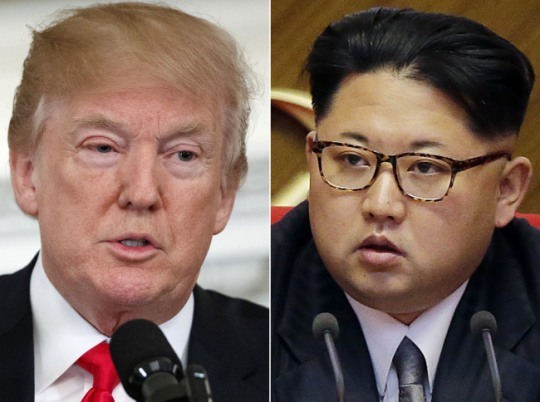US President Donald Trump has accepted an invitation to sit down with North Korean leader Kim Jong-un by May for talks to denuclearize the Korean Peninsula, but their different understandings of “denuclearization” stand as a major stumbling block to the possibly history-making talks.
Despite growing hopes that the breakthrough between North Korea and the US could tackle the nuclear standoff, skepticism also lingers over whether the summit between Trump and Kim can be held and if so whether it would be successful.
Trump accepted Kim’s invitation after the reclusive regime met the preconditions suggested by the US. Kim agreed to commit to denuclearization, suspend nuclear and missile tests, and refrain from criticizing upcoming joint military exercises between South Korea and the US.
Despite growing hopes that the breakthrough between North Korea and the US could tackle the nuclear standoff, skepticism also lingers over whether the summit between Trump and Kim can be held and if so whether it would be successful.
Trump accepted Kim’s invitation after the reclusive regime met the preconditions suggested by the US. Kim agreed to commit to denuclearization, suspend nuclear and missile tests, and refrain from criticizing upcoming joint military exercises between South Korea and the US.

The North has said nothing yet about its view of the potential summit and what it meant when it said it is willing to denuclearize.
Though Washington and Pyongyang are on track to hold their unprecedented summit, one of the major hurdles the two countries is facing is differences over how they interpret denuclearization and what steps should be taken to achieve the goal, experts say.
North Korea’s reported willingness to denuclearize is “encouraging,” but there is a “need to better understand what Kim means by denuclearization,” according to Joseph DeTrani, former US special envoy for nuclear talks with North Korea.
“We know what it means -- complete, verifiable and irreversible dismantlement of its nuclear programs -- but we need to hear it from North Korea. Greater clarity from North Korea is necessary,” he said.
The US has been clear about its version of denuclearization -- a complete, verifiable and irreversible end to North Korea’s nuclear weapons programs confirmed by an external body.
But to North Korea, it could mean less than that. It might define denuclearization as a long-term goal that would only be achieved in return for concessions from the US -- such as sanctions relief, withdrawing troops from South Korea and a peace treaty.
“North Korea is saying that it will enter the denuclearization process only when it is sure that its regime’s security is guaranteed,” said Cho Sung-ryul, a senior researcher at the Institute for National Security Strategy.
“Talks with North Korea could collapse if South Korea and the US focus only on denuclearizing the isolated country without offering any measures to guarantee the North Korean regime’s survival.”
Kim Dong-yup, a professor at Kyungnam University’s Far East Institute, pointed out that North Korean leader is serious about his offer, but only because he now has nuclear weapons programs that will take time to dismantle.
“I think what North Korea wants most in return would be sanctions relief and a peace treaty with the US, which Kim Jong-un sees as crucial to securing its regime survival. He needs to make sure that his country is safe to his own people,” Kim said.
North Korean leader will not likely seek an end to the Washington-Seoul alliance or withdrawal of all US troops from the peninsula, which the professor called “North Korea’s rhetoric of the past when it didn’t have nuclear weapons programs.”
But there is a bumpy road ahead for talks between North Korea and the US to take place by May.
“The biggest issue facing Trump and Kim in the run-up to their summit would be exploring what the other side means by denuclearization,” he said. “Even if North Korea is serious about giving up its nuclear weapons programs, what North Korea would demand in return and whether the US is ready to give what the North wants would be another challenge.”
“It remains to be seen whether talks between Trump and Kim could actually take place,” he said.
In the middle of the US and North Korea, South Korea has sought to broker talks between Washington and Pyongyang. The government believes that once they sit down for talks, they can find a way to ultimately achieve the goal of denuclearization.
Foreign Minister Kang Kyung-wha plans to leave for the US on Thursday to hold talks with her counterpart Rex Tillerson to better coordinate their strategy on North Korea. The South Korean government also backs “a complete, verifiable and irreversible denuclearization,” according to the ministry.
While White House press secretary Sarah Sanders said Monday that Washington fully expects talks with Pyongyang to take place, US officials appear to remain cautious about the growing optimism.
The US will make no concessions to North Korean leader Kim Jong-un in discussions leading to potential talks between the reclusive leader and Trump, and during any subsequent negotiations, CIA Director Mike Pompeo said on “Fox News Sunday.”
Secretary of State Rex Tillerson told reporters Monday in Abuja, Nigeria, that “it’s very early stages” when asked about plans for the meeting, expected in May. “We’ve not heard anything directly back from North Korea, although we expect to hear something directly from them.”
(laeticia.ock@heraldcorp.com)
-
Articles by Ock Hyun-ju





![[From the Scene] Monks, Buddhists hail return of remains of Buddhas](http://res.heraldm.com/phpwas/restmb_idxmake.php?idx=644&simg=/content/image/2024/04/19/20240419050617_0.jpg&u=20240419175937)





![[Graphic News] French bulldog most popular breed in US, Maltese most popular in Korea](http://res.heraldm.com/phpwas/restmb_idxmake.php?idx=644&simg=/content/image/2024/04/18/20240418050864_0.gif&u=)



![[From the Scene] Monks, Buddhists hail return of remains of Buddhas](http://res.heraldm.com/phpwas/restmb_idxmake.php?idx=652&simg=/content/image/2024/04/19/20240419050617_0.jpg&u=20240419175937)

![[KH Explains] Hyundai's full hybrid edge to pay off amid slow transition to pure EVs](http://res.heraldm.com/phpwas/restmb_idxmake.php?idx=652&simg=/content/image/2024/04/18/20240418050645_0.jpg&u=20240419100350)

![[Today’s K-pop] Illit drops debut single remix](http://res.heraldm.com/phpwas/restmb_idxmake.php?idx=642&simg=/content/image/2024/04/19/20240419050612_0.jpg&u=)